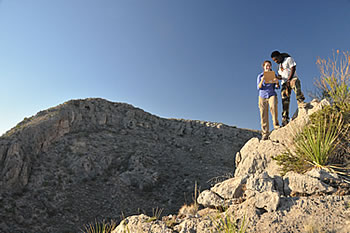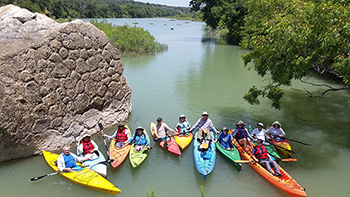Workshops
1. Cutting Edge Mapping with Drones: Practical and Cost Effective!
Sun., 12 March, 2–4 p.m. Cost: $10 includes workshop booklet.
Principal Organizer: Robert Youens, Camera Wings Aerial Photography-CameraWings@aol.com.
Description: Join Camera Wings Aerial Photography and learn about drone integration into geoscience research. You will get a unique opportunity to see the latest equipment and cutting-edge projects and discuss the regulatory environment surrounding this new technology. You can’t afford to be left behind.
2. Ethics Training Seminar for Texas Board of Professional Geologist Continuing Education.
Sun., 12 March, 1–2 p.m.Cost: $5.
Principal Organizer: T. Wesley McCoy, P.G., Texas Board of Professional Geoscientists, wmccoy@tbpg.state.tx.us.
Description: This one-hour training session is designed to meet the annual ethics training requirement for annual renewal of Texas Geoscientist Professional Geologist licensing.
Field Trips
For additional information, please contact the Field Trip Chair, Dan Lehrmann.

West Texas students. Courtesy of Benjamin Surpless.
1. The Edwards Aquifer—A System under Stress.
Cosponsored by GSA Karst Division.
Sat., 11 March, 8:30 a.m.–5 p.m. Cost: $66, includes transportation, lunch, and guidebook.
Principal Organizer: Geary Schindel, Edwards Aquifer Authority, gschindel@edwardsaquifer.org.
Description: This field trip will provide an overview of the Edwards Aquifer and include discussions on water-quality issues related to urbanization and competing demands for groundwater from agricultural, municipal, industrials, ecological, and recreational interests along the rapidly growing San Antonio–Austin corridor. Field trip stops will include cave entrances in an urban setting; a flood control/recharge dam; urban development; aquifer monitoring and research initiatives; a highly faulted outcrop of the Edwards Limestone; Comal Springs, the largest spring in the southwest; and saline monitoring wells.
2. South-Central Texas Underground.
Cosponsored by GSA Karst Division.
Sun., 12 March, 11:30 a.m.–5 p.m. Cost: $20 includes transportation and all lights, helmets, gloves, kneepads for the trip.
Principal Organizer: Geary Schindel, Edwards Aquifer Authority, gschindel@edwardsaquifer.org.
Co-organizers: Jess Buckles, Univ. of Texas at San Antonio, suddsu@gmail.com, and members of the Bexar Grotto of the National Speleological Society.
Description:This trip will visit Robber Baron Cave to discuss hypogene speleogenesis and karst hydrology of this wild cave. Robber Baron Cave is located in the Austin Chalk near the San Antonio Airport. This mile long cave is owned by the Texas Cave Management Association and is used for education and conservation purposes. It is the home of the Federally Listed Robber Baron Cave Spider, found nowhere else in the world. View a map and some photos of the cave.
IMPORTANT: Robber Baron is an undeveloped cave and has no trails or lights. Participants will be walking, stooping, crawling, and climbing though the cave to look at and discuss the cave geology and how it relates to the regional hydrology. This is a challenge by choice and you will be able to leave the cave if necessary.. The cave may be strenuous for the unexperienced but should be manageable for those in reasonable fitness. The leader of the trip is 6 foot tall, weighs over 200 pounds and is approaching 60 years old. After the trip, the group may visit a local restaurant where they are responsible for their food and drink. You will want to wear old clothes and a T-shirt in the cave. The cave may be muddy and is very hot. Sturdy shoes are also recommended. Please bring a change of clothes for after the trip.
3. Traversing the Trinity and Edwards Aquifers along the Blanco River, Central Texas.
Sun 12 March
Canceled.
4. The Eagle Ford and Austin Chalk Groups in and around San Antonio.
Cosponsored by GSA Sedimentary Geology Division.
Sun., 12 March, 8 a.m.–4:45 p.m. Cost: $100 includes transportation in minibuses, field guidebook, breakfast, lunch box, and refreshments (water, soda).
Principal Organizers: Alexis Godet, Univ. of Texas at San Antonio, alexis.godet@utsa.edu; John Cooper, Univ. of Texas at San Antonio, jcgolf.cooper@gmail.com.
Co-organizers: Michael Pope, Texas A&M Univ., mcpope@tamu.edu.
Description: During the Late Cretaceous, global oceanic anoxic events and oceanographic trends shaped the sedimentation style in the northern Gulf of Mexico by favoring the deposition of organic-rich marlstones (Eagle Ford Group) and thick muddy carbonates (Austin Chalk Group). We invite contributions that aim to (1) refine the Late Cenomanian–Early Campanian; (2) assess the driving mechanisms of regional trends in facies changes; and (3) assess the impact of global phenomena on the sediment production along the northern margin of the Gulf of Mexico.
5. Cretaceous Sedimentary Succession, Dinosaur Tracksites, and Structural Geology of the Canyon Lake Gorge and Heritage Museum of the Hill Country.
Cosponsored by GSA Sedimentary Geology Division.
Sun., 12 March, 7 a.m.–5 p.m. Cost: $80 includes guidebook, transportation, lunch, and entry fees.
Principal Organizer: Marina Suarez, Univ. of Texas at San Antonio, Marina.Suarez@utsa.edu.
Co-organizers: Thomas Adams, Witte Museum, thomasadams@wittemuseum.org.
Description: This trip will focus on the processes involved in erosion of the gorge during a catastrophic flood; the marine sedimentary facies, fossils, sequence stratigraphy and depositional environments of the Glen Rose Formation; and the structure of the Hidden Valley fault system. We will also investigate what can be learned from the dinosaur trackways.

Kayaking on Llano River, southwest of Mason Texas. Photo provided by Tony Plutino (Llano River Adventures).
6. Precambrian Geology of the Western Llano Uplift.
Sat.–Sun., 11–12 March
Canceled.
7. Cambrian Microbialites and Associated Marine Facies, Llano River, Mason County.
Cosponsored by GSA Sedimentary Geology Division.
Fri.–Sun., 10–12 March, 5:30 p.m. departure on Friday; return at 5 p.m., Sunday. Cost: $380 includes transportation, refreshments, guidebook, kayak rental, and overnight lodging at the Honey Creek Ranch on the Llano River, Friday and Saturday nights. Meals are covered by participants at local restaurants.
Principal Organizer: Andre Droxler, Rice Univ., andre@rice.edu.
Co-organizer: Dan Lehrmann, Trinity Univ., dlehrmann@trinity.edu.
Description: Microbialites are important components of marine depositional systems from Precambrian to recent. We will examine large Cambrian microbialite buildups and oolitic-skeletal grainstones that are spectacularly exposed in cross section and plan view. Their architecture and genesis will be analyzed in the context of sequence stratigraphy and mixed carbonate-siliciclastic sedimentation.